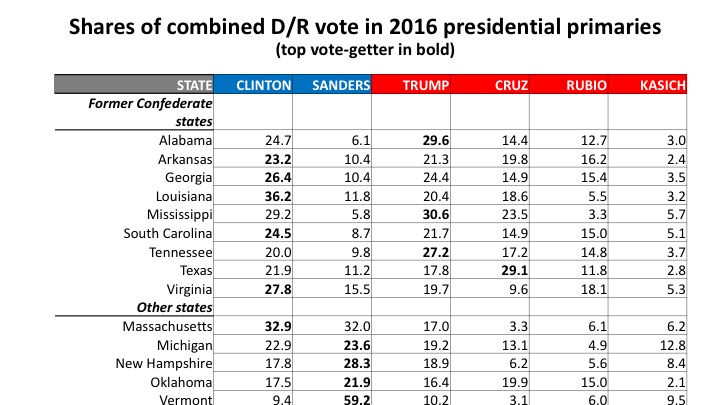Yesterday Bernie Sanders scored an upset win in the Michigan presidential primary, getting 49.8 percent of the vote to Hillary Clinton’s 48.3 percent, but Mrs. Clinton is still the heavy favorite for the Democratic nomination. Donald Trump got only 36.5 percent in Michigan’s Republican primary, but because his opposition was divided, that was enough for a win and a further diminishing of hopes that he can be prevented from claiming the GOP nomination. Both Mrs. Clinton and Mr. Trump were able to offset middling performances in Michigan with big wins in Mississippi, continuing regional patterns from this primary season.
Both Mr. Trump and Mrs. Clinton owe at least part of their success to the front-loading of Southern states on the primary calendar. Nine of the 11 former Confederate states have selected delegates for both major party conventions (Florida and North Carolina vote next Tuesday), but only 10 of the other 39 states have held contests for both parties. Mrs. Clinton has done very well in the former Confederate states, beating Mr. Sanders in all of them by at least 29 points. (Virginia has been the closest, going for Mrs. Clinton 64-35.) Outside of the old Confederacy, her biggest win so far has been a six-point victory over Mr. Sanders in the Nevada caucuses. Notably, she lost the Democratic primary in Oklahoma, a Southern state with a small black population that was not part of the Confederacy. But her overwhelming margins in the rest of the South, resembling Bill Clinton’s 1992 primary wins more than her own near-majority coalition in 2008, should keep her comfortably in front in terms of delegates even if Mr. Sanders splits the rest of the country with her.
Mr. Trump has a slightly different regional pattern. Outside of the Maine caucuses, he’s won every state that includes even a tiny piece of the Appalachian mountain range, from New Hampshire and Vermont to Alabama and Mississippi (he’s also won contests in Arkansas, Hawaii, Michigan and Nevada). The only former Confederate state he’s lost has been Texas, home of Sen. Ted Cruz. Even if Mr. Cruz continues to do well in Farm Belt and western states, even if John Kasich wins his home state of Ohio next week and even if Mr. Trump loses the popular vote in California’s “winner-take-most” primary, his big wins in the Appalachian states are likely to keep him in the lead for delegates all the way through the primary season.
The chart below breaks down the combined Democratic and Republican votes in each state that has held primaries in both parties, according to unofficial results from the Associated Press. (Caucus states are generally incomparable because the parties often operate under different rules.) Mrs. Clinton has been the top vote-getter in six of the 14 states that have voted so far. Mr. Trump has been the top vote-getter in three—Alabama, Mississippi and Tennessee—and has received more than one-fifth of the total vote only in former Confederate states. Outside of the old Confederacy, Mr. Sanders has received more votes than Mr. Trump in every state.
So far, about 11.5 million votes have been cast in Republican primaries (counting only states where both parties have held primaries) and 8.0 million votes have been cast on the Democratic side. More people have taken Democratic ballots only in Massachusetts, Vermont and (barely) Louisiana. In only Massachusetts and Michigan, both of the top vote-getters have been Democrats (i.e., Mrs. Clinton and Mr. Sanders); in every other state, the top two have included the winner in each party.









